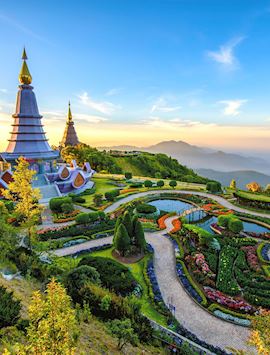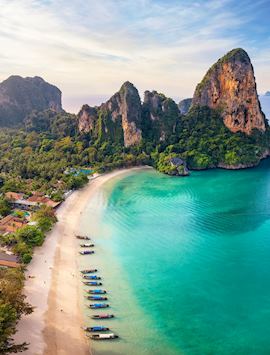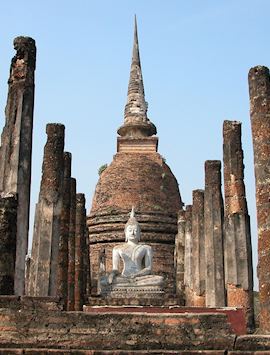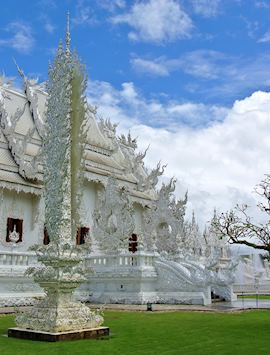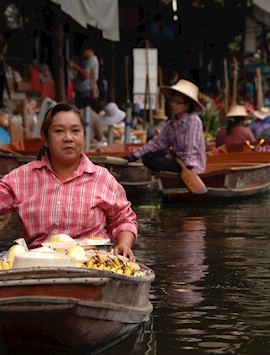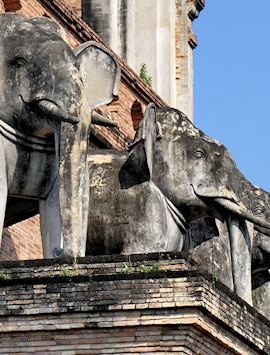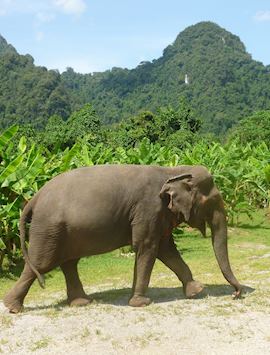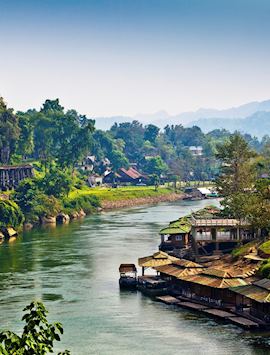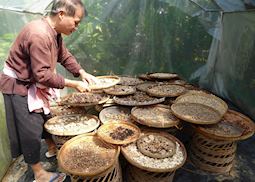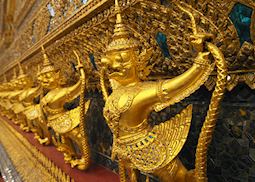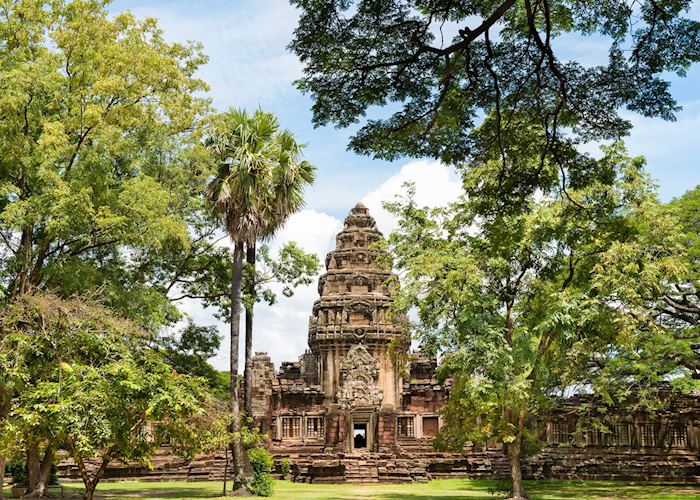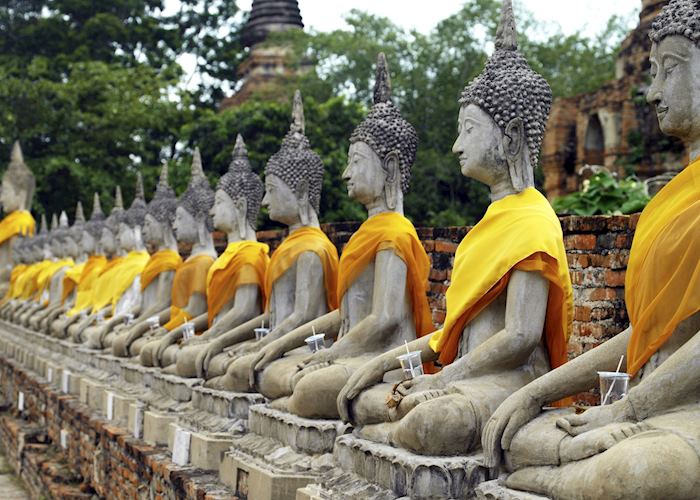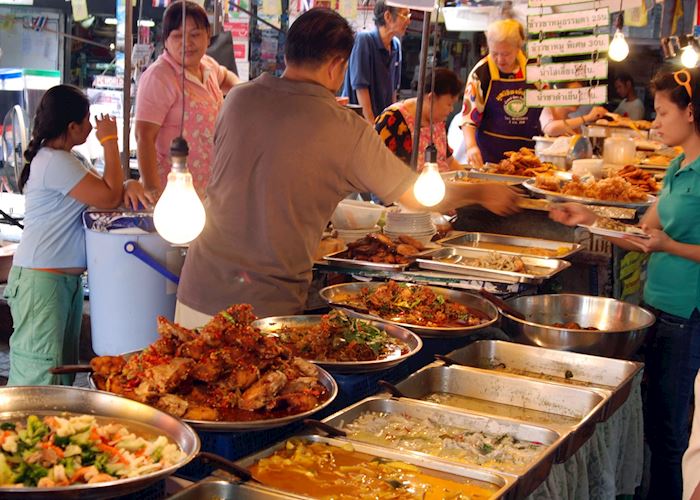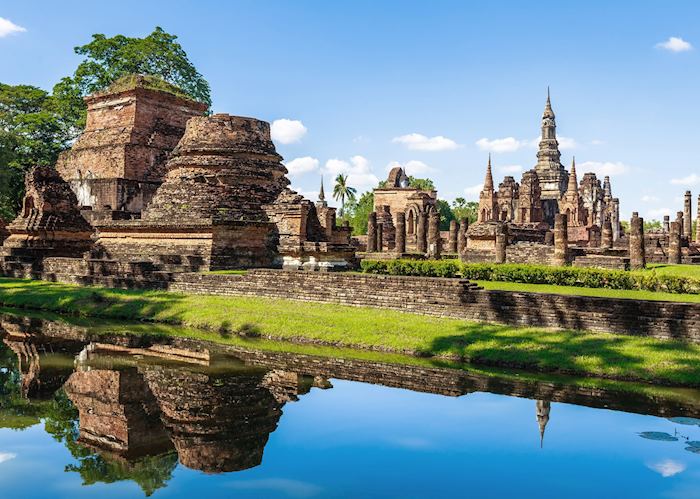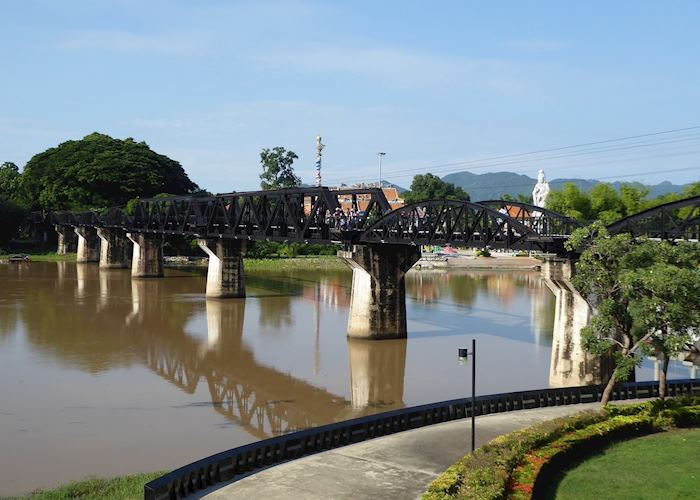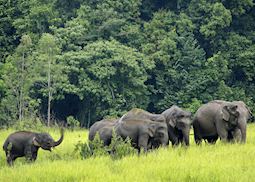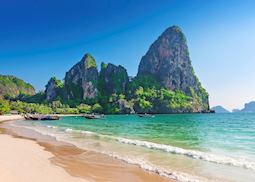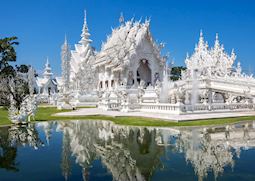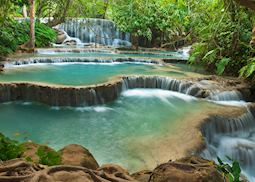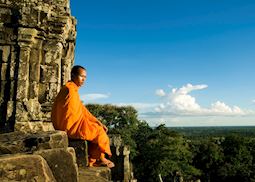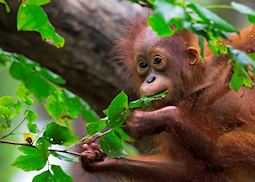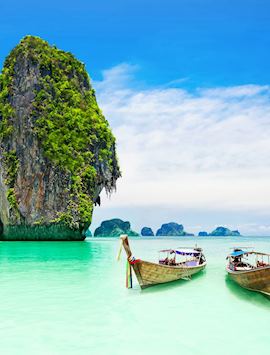
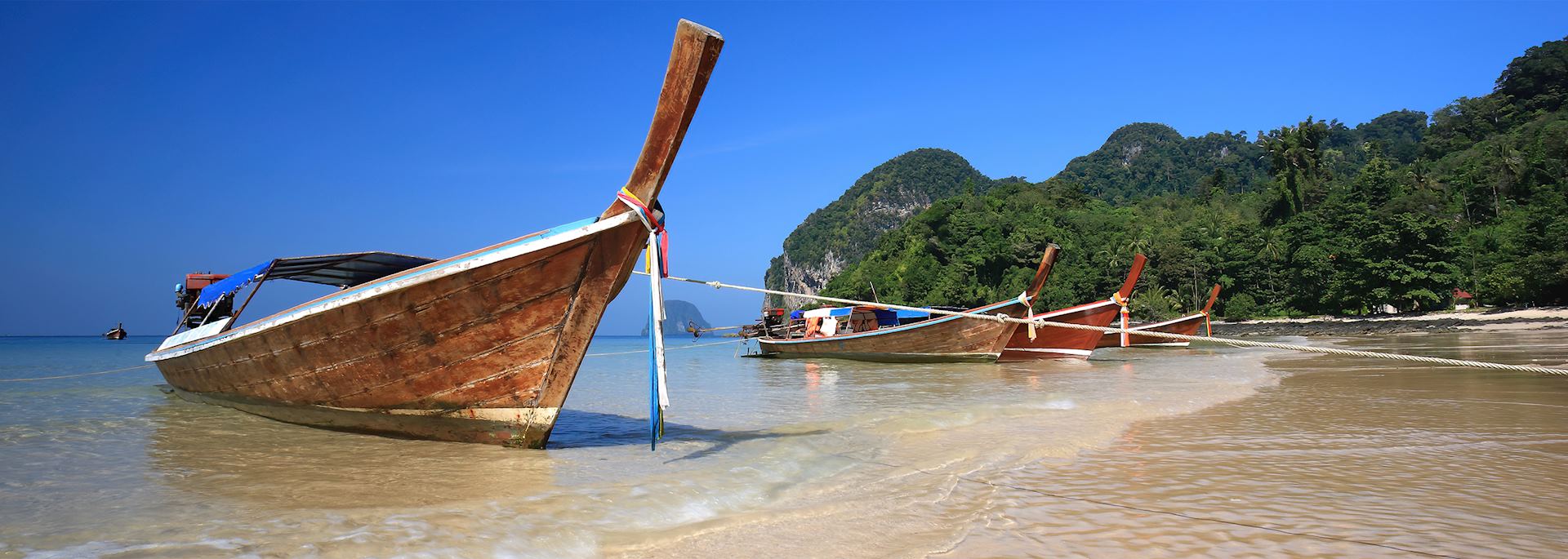
Tailor-made Thailand holidays shaped around your passions
Thailand is a renowned beach destination, but our specialists know there’s far more to it than its palm-fringed sands. Having journeyed the breadth of the country, they can advise you on the best places to visit, based on your preferences, to get the most out of your holiday to Thailand.
Inland, you’ll find temples in the shape of Isaan’s Khmer complexes and the UNESCO-protected ancient capital of Siam at Sukhothai as well as, from more recent history, the Bridge on the River Kwai. National parks foster elephants and gibbons, and hills preserve rich tribal cultures. There are also the cities, which provide a route into exploring Thailand’s food, such as the street markets in Chiang Mai and cooking classes in Bangkok. Along the coast, you’ll find sleepy villages where you can watch local fishermen bringing in the day’s catch, while limestone islands rising from the sea make the focal points for rewarding cruises.
Reduced fares currently available through our airline partners
We have a number of reduced fares available with selected airline partners. Click below for further details on booking and travel periods.
View offersSuggested tours for Thailand
Explore busy Bangkok on a tuk-tuk and long-tail boat, visit floating markets in Amphawa, and trek to remote villages to meet the people who live there. Our suggested itineraries are a great starting point as you begin to plan your trip to Thailand.
Suggested activities for Thailand
Experience an early morning chanting ritual at Wat Pho, cruise along the rivers of Khao Sok National Park, and join a local Thai family to spend a day on their farm. Whatever your interests, our specialists will suggest experiences designed to enhance your trip to Thailand.
-
Thai home life & cooking experience Responsible Choice We've hand-selected a range of tours and stays across the world that go above and beyond to be a force for good by supporting local businesses, educating staff, challenging local norms, or promoting conservation and biodiversity efforts. Your Responsible Choice helps increase the positive impact of your trip.![Mr Prapat explaining the herbs in his garden]()
Thai home life & cooking experience
Chiang MaiThai home life & cooking experience
Learn how to cook like a local at a Thai home near Chiang Mai. You’ll spend the day with your host family, listening to their stories and plucking fresh produce from the garden, before turning it into a feast under their careful guidance.
View details -
Wat Pho & The Grand Palace ![Bangkok, Thailand]()
Wat Pho & The Grand Palace
BangkokWat Pho & The Grand Palace
An early start will get you to Wat Pho in time to experience the monks' early morning chanting ritual and avoid the crowds who arrive later.
View details -
Private cruise & lunch on Phang Nga Bay ![James Bond Island, Phang Nha Bay]()
Private cruise & lunch on Phang Nga Bay
PhuketPrivate cruise & lunch on Phang Nga Bay
Together with your own private captain, you can explore Phang Nga Bay’s striking karst scenery and mangrove forests aboard a traditional long-tail boat. You’ll also get to unwind on white-sand beaches and enjoy a seafood lunch on a private island.
View details
Why travel with Audley?
- 100% tailor-made tours
- Fully protected travel
- Established for over 25 years
- 98% of our clients would recommend us
Best time to visit
Our specialists advise on the best months to visit Thailand, including information about climate, events and festivals.
Request our brochure
Covering all seven continents, The World Your Way shows you how you can see the world with us. It features trip ideas from our specialists alongside hand-picked stays and experiences, and introduces our approach to creating meaningful travel experiences.
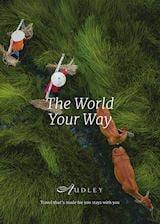
Useful information for planning your holiday in Thailand
Tipping is becoming more and more ingrained in Thai culture, so we recommend tipping around 10% in restaurants, if a service charge isn’t already included. Tipping tuk-tuk drivers, guides, and other service workers isn’t mandatory but is appreciated, and we can advise you on recommended amounts.
In Thailand, you’ll find coconut-milk curries, steamed whole fish, and expertly seasoned snacks almost anywhere you go, but the best place to eat them is in open-air street food stalls and small restaurants popular with the locals. Thai cuisine brings together a complex balance of fresh herbs and spices, like kaffir lime and lemongrass, to create dishes that are sweet, salty, and sour all at once. We can arrange an authentic cooking class so you can recreate the tastes when you get back home.
To drink, you could sample malty local beers, such as Singha, or a refreshing Sabai Sabai cocktail made with Thailand’s spiced molasses-based spirit Mekhong. For something non-alcoholic, tangy fresh fruit juices, coconut milk straight from the shell, and chai yen, a local iced tea with milk, are widely available.
The official language spoken in Thailand is Central Thai, also known as ‘Siamese’, but many people also speak English. You may also hear Southern Thai, Northern Thai, Isan, and Phu Thai, which are separate languages but are closely related to Central Thai and have historically been grouped as one Thai language.
The currency of Thailand is the Thai baht (THB, ฿), which consists of notes in denominations of 1000, 500, 100, 50, and 20 baht, as well as coins in denominations of 10, 5, 2, and 1 baht. There are coins for 50 and 25 satangs, too, but these are rarely used.
ATMs are widespread in Thailand, especially in major cities. Most machines take all credit cards, as well as Cirrus, Plus, Maestro, and Solo cards. Some ATMs charge a fee, which is typically around 200THB per withdrawal. You’ll need cash for smaller restaurants and tipping.
For the latest travel advice for Thailand, including entry requirements, health information, and the safety and security situation, please refer to the Foreign, Commonwealth & Development Office website.
Thailand is known for its palm-fringed beaches and lively Bangkok streets, but there’s a lot more to do and see if you’d like to explore further, including ancient capital ruins, vast swathes of forested mountains, and a rich cultural heritage.
If you’re a history lover, you could learn about the Siam Kingdom as your guide walks you through the expansive, intricately carved ruins in Sukhothai or Ayutthaya. If nature piques your interest, you could take a night safari in Khao Yai National Park to spot wild elephants, sambar, and gibbons. Or if you prefer soaking in the local culture, we can arrange a visit to a Hmong and Lahu village in the hills near Chiang Khong where you can learn how to decorate clothing using traditional dyeing techniques.
Thailand offers a diverse array of accommodation options, from luxury villas on the beach to family-run hotels in the heart of the city, as well as eco-friendly lodges resting upon jungle-clad hillsides. But you don’t have to choose just one — some of the most rewarding Thailand trips take you across the country, allowing you to experience a tapestry of Thai living.
Take a look at where you could stay on your Thailand trip.
Bangkok provides a launchpad into the rest of Thailand, including the pearly white beaches of the south and remote villages of the north, but it also offers a vibrant introduction to the country’s culinary culture with street food aplenty.
Then, you can head to Khao Lak, a more tranquil alternative to Phuket, to explore secluded coves and unwind on powder-soft beaches. The karst-carved scenery of Khao Sok National Park is nearby where you can spend the day hiking to hidden waterfalls or meeting the resident elephants at the ethical Elephant Hills Camp. Alternatively, you could head further north to Chiang Rai to experience authentic local life with fewer crowds around. Around here, you can learn about tea and coffee farming, explore hillside villages, and delve into highly decorative Buddhist architecture dating back centuries.
It takes around 12–16 hours to fly from the UK to Thailand’s capital of Bangkok. We recommend flying with EVA Air, Qatar Airways, Oman Air, and a few other airlines, which we can advise on.
The time zone in Thailand is GMT+7, and daylight saving time isn’t observed so the clocks never change.
The best way of getting around in Thailand depends on where you want to go and the activities you’re doing there. If you’re heading from the busyness of Bangkok to the tranquil beach resorts of the south, taking a domestic flight will be simplest. For other routes, we can advise if it’s best to take the train, ferry, or a private car. Once at your destination, you can explore by foot or take an open-air tuk-tuk to cover more ground.
Use our travel tool to find up-to-date visa and passport requirements for Thailand. Enter where you’re travelling to and from (including any stopover destinations en route or flight layovers), along with your intended travel dates and passport details, for a full list of requirements.
You should check with your doctor to find out which vaccinations you need for Thailand, but you should be up to date with your home country’s recommend vaccinations as a minimum. You can also take a look at the Travel Health Pro website for suggested vaccinations.
If you’re travelling to Thailand from a country that’s considered to have a risk of yellow fever by the World Health Organization (WHO), then you may be asked to provide proof of vaccination against the disease upon arrival.
Thai people are very tolerant of visitors and don’t expect you to conform to their culture, but take care to respect the monarchy and Buddhist religion. It’s polite to avoid raising your voice in public as Thai people are typically softly spoken and avoid confrontation. Finally, if someone bows with their hands together (a ‘wai’), it’s polite to do the same in return.
You must treat any portrait of the King or members of the royal family with respect, which extends to currency and stamps. If you drop a Thai coin or note, be sure to pick it up, and never stand on a coin or note if you see one on the floor. When sending letters or postcards, use the small sponge available for attaching the stamp to a letter instead of licking it.
When visiting a temple in Thailand, you’ll be expected to cover your shoulders and knees and remove your shoes and hat. Some temples, such as the Grand Palace in Bangkok, ask that you wear clothing that covers your body down to the ankle.
Once inside, don’t touch anything that may be of religious significance, such as Buddha statues, altars, and burial grounds. You should also avoid pointing the soles of your feet toward a Buddha image — or anyone, for that matter.
Thailand in pictures
Our expert guides to travelling in Thailand
Written by our specialists from the viewpoint of their own travels, these guides will help you decide on the shape of your own trip to Thailand. Aiming to inspire and inform, we share our recommendations for how to appreciate Thailand at its best.
-
![Thailand: the Audley way]()
Thailand: the Audley way
This short video of Thailand takes a look at its many highlights including its delicious cuisine, temples, white sand beaches and friendly people.
-
Off-the-beaten-track Thailand ![Elephants in Khao Yai National Park, Thailand]()
Off-the-beaten-track Thailand
Off-the-beaten-track Thailand
Spotting wild elephants, visiting rural villages nestled in the hills, and relaxing on empty beaches — it pays to venture beyond Thailand’s visitor hotspots. Southeast Asia specialist Dom shares his recommendations for getting off the beaten track.
Read this guide -
Thailand's best beach holidays and resorts ![Thai beach]()
Thailand's best beach holidays and resorts
Thailand's best beach holidays and resorts
The beaches of Thailand have always been alluring to travellers. We highlight some of the best beaches (and where to stay on them), all of which you can incorporate as a relaxing end (or start) to your journey in Southeast Asia.
Read this guide -
What to do in Thailand: our highlights guide ![The White Temple, Chiang Rai]()
What to do in Thailand: our highlights guide
What to do in Thailand: our highlights guide
From Bangkok’s Grand Palace to Chiang Mai’s temples and the Andaman Coast’s powdery beaches, specialist David showcases what you could experience on a trip to Thailand, focusing on the headline sights and destinations.
Read this guide -
Family holidays in Thailand ![Khao Sok National Park,Thailand]()
Family holidays in Thailand
Family holidays in Thailand
It's hard to imagine a more family-friendly destination than Thailand. Family traditions are deeply revered in the country and the Thais have a natural affinity with children. Here, we present a few of our favourite family-friendly places and activities.
Read this guide



